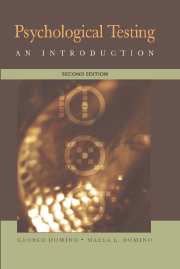Book contents
- Frontmatter
- Contents
- Preface
- Acknowledgments
- PART ONE BASIC ISSUES
- PART TWO DIMENSIONS OF TESTING
- PART THREE APPLICATIONS OF TESTING
- PART FOUR THE SETTINGS
- PART FIVE CHALLENGES TO TESTING
- 16 The Issue of Faking
- 17 The Role of Computers
- 18 Testing Behavior and Environments
- 19 The History of Psychological Testing
- Appendix: Table to Translate Difficulty Level of a Test Item into a z Score
- References
- Test Index
- Index of Acronyms
- Subject Index
- References
17 - The Role of Computers
from PART FIVE - CHALLENGES TO TESTING
Published online by Cambridge University Press: 05 June 2012
- Frontmatter
- Contents
- Preface
- Acknowledgments
- PART ONE BASIC ISSUES
- PART TWO DIMENSIONS OF TESTING
- PART THREE APPLICATIONS OF TESTING
- PART FOUR THE SETTINGS
- PART FIVE CHALLENGES TO TESTING
- 16 The Issue of Faking
- 17 The Role of Computers
- 18 Testing Behavior and Environments
- 19 The History of Psychological Testing
- Appendix: Table to Translate Difficulty Level of a Test Item into a z Score
- References
- Test Index
- Index of Acronyms
- Subject Index
- References
Summary
AIM This chapter looks at the role of computers in psychological testing. Computers have been used as scoring machines, as test administrators, and recently as test interpreters. We look at the issue of computer-based test interpretation (CBTI) and questions about the validity of such interpretations. We consider ethical and legal issues, as well as a variety of other concerns. The role of computers in testing is a very “hot” topic currently, with new materials coming out frequently. Entire issues of professional journals are devoted to this topic (e.g., December 1985 issue of the Journal of Consulting and Clinical Psychology and the School Psychology Review, 1984, 13, [No. 4]), and there are entire journals that focus on computers and psychology (e.g., Computers in Human Behavior). At the same time, this is a relatively new field, and many issues have not yet been explored in depth.
HISTORICAL PERSPECTIVE
Computers have been involved in some phase of psychological testing ever since the mid 1950s when computer centers were established on university campuses. One of the first uses of campus computers was to score tests that previously had been hand scored or mechanically scored.
Although a wide variety of tests were involved in this phase, from achievement tests to personality inventories, much of the early impetus focused on the MMPI.
A second area of computer and testing interface involved the direct administration of the test by computer.
- Type
- Chapter
- Information
- Psychological TestingAn Introduction, pp. 460 - 482Publisher: Cambridge University PressPrint publication year: 2006



